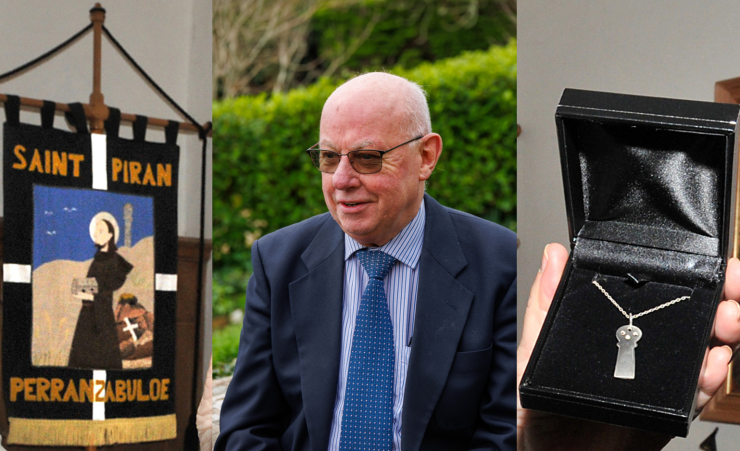Cross of St Piran Awards 2023: David Ball

David will be one of the recipients of this year’s Cross of St Piran awards at a ceremony on Sunday 5 March.
The great orchestral conductor Sir Thomas Beecham was once strolling around a churchyard, when he came across a headstone which announced, “Here lies the body of a fine musician and an organist.”
“However did they manage to fit two people into such a small grave?” Sir Thomas had paused to ask.
As he tells that story, it quickly becomes clear that David Ball is a fine musician and organist who doesn’t take himself too seriously. He evidently however takes his commitment to music very seriously indeed.
David was born and raised in Cornwall. In 1965, he travelled to the University of York to read Chemistry. After a brief stint on a management course with the food giant Rank Hovis MacDougall, he returned to his studies. He completed a Diploma in Education at the University of Bath, and then came back to Cornwall, to teach Chemistry at Redruth School, where he later became Head of Sixth Form.
Decades afterwards, when he chose to take early retirement, the school brought him back for a further eight years as a regular supply teacher.
His passion for science has always sat closely with his faith.
“My faith basically is scientific,” he says. “I don’t take everything literally.”
He recalls recently reading the lesson in his parish church. It was the story of the creation. After the service, he found himself discussing the first chapter of Genesis with a friend. “I said, scientifically speaking, I don’t think it’s wrong. The timeline’s almost right. But instead of seven days, let’s have 700 million years.”
There are, he observes, 92 naturally occurring elements, said to have been formed out of hydrogen at the moment of the Big Bang. “But where,” he asks, “did that come from?”
He sees the hand of divinity in the precision of the astronomic balances that keep the Moon facing the Earth as it turns in its orbit and that keep the Earth revolving round the Sun.
He sees it in the fact that the almost uniquely fluid state of water on the surface of most of our world permits the possibility of life.
“Water stays liquid within a very small temperature range,” he explains. “If our planet was a little closer to the sun, it would be water vapour. If it were further away, it would all be ice.
“These things give me the idea that there’s something going on greater than just chance.”
His love of science and his faith also combine to give him grave concerns for the future of our natural environment.
“The ways things are going with the planet,” he says, “makes me remember what I used to tell my students – we don’t inherit things from our parents, we borrow them from our children.”
His greatest passion in life, though, is his music. While at university, he had been taught by the deputy organist at York Minster, and had on occasion had the opportunity to practise in that great cathedral. He has played the organ at St Hilary Church, near Penzance, since 1966.
He recalls he’d originally offered to step in to help out for a fortnight when the regular organist had been away.
“It’s been a long fortnight,” he says.
Around that time, he also took on the role of organist at his family church at Perranuthnoe, where he’d once sung as a choirboy. More than half a century later, he continues to play regularly at both places of worship.
For 27 years, he ran annual concerts at St Hilary to raise funds for local charities. He has served as president of the Cornwall Organists Association and of the Penzance Choral Society. For two decades he was conductor for the Penzance Orchestral Society, with whom he has also played oboe and viola. For more than 50 years, he has also been one of the principal organists at St Michael’s Mount. At one stage, he was running three orchestral concerts a year.
In 2011, Gorsedh Kernow awarded him their prestigious Music Shield “for outstanding services to music in Cornwall”. As a bard of Cornish Gorseth, he was given the title of Mab Kymygieth hag Ilow – “Son of Chemistry and Music”.
He has also supported his local parish in a range of lay roles including deputy churchwarden and as a member of the Parochial Church Council. At one point, he was serving as churchwarden, treasurer and organist for St Hilary all at the same time.
“But I’ve not been the vicar yet,” he laughs. “With a name like Ball, I could have been Canon Ball, couldn’t I?”
He says he feels “very honoured” to have been chosen to receive the Cross of St Piran award.
“I said to some people the other day, I said – it’s not just for me. All the things I’ve done, I couldn’t have done them without the cooperation of other people. But it’s still very kind.”
Music, he says, continues to mean a very great deal to him. He lists Johann Sebastian Bach and Joseph Haydn as two of his great musical heroes.
“I suppose the greatest composer is Bach. If I had to go on a desert island, the music I’d take with me would have to be Bach. He had great faith. He was in many ways a very talented town organist.
“Haydn was said to be a very good person, with a great sense of humour. But he didn’t believe it was his own talent. He believed it was given to him by God.”
It wouldn’t be too much to suggest that David himself embodies a charmingly similar blend of humility, devotion, talent, grace and faith.
The Cross of St Piran awards ceremonies will take place at special services at 3.30pm and at 6.30pm on Sunday 5th March at St Piran’s Church, Perranzabuloe.
